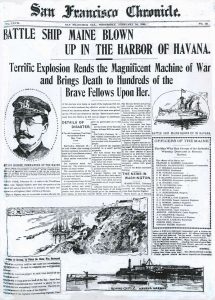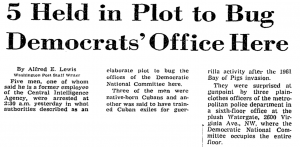San Francisco Chronicle. 1898. “Battle Ship Maine Blown Up In The Harbor of Havana.” February 16.
In this article, O’Rourke reports on the sinking of the US Maine in Havana, Cuba. The article reports what happened the morning of February 15th. O’Rourke writes about several theories which may have caused the explosion, including the possibility that it was caused by a grenade thrown over the navy yard fence. The reporting of the sinking of the USS Maine pushed public opinion for the U.S. to declare war on Spain. The public, because of the sensationalized journalism, (Yellow Journalism) was convinced that Spain was responsible. In the years following the peak of Yellow Journalism, newspapers would take a turn from sensationalist journalism to factual news delivery, putting pressure on the government to create new reforms
Upton, Sinclair. 2013. The Jungle. USA: Createspace.
Muckraking reporting often advocated political reform, legislative protection for workers, and a distrust for the growing influence of business monopolies. Upton Sinclair’s novel, The Jungle, gave a vivid description of abuses and unsafe conditions by the meat packing industry. The book contributed to the creation and passage of legislation, such as the 1906 Meat Inspection Act and the Pure Food and Drug Act, that ensured the safety of food products.
Sheehan, Neil. 1971. “Vietnam Archive: Pentagon Study Traces 3 Decades of Rising U.S. Involvement.” New York Times, June 13.
In this New York Times article, Sheehan writes about secret U.S. government documents that the New York Times had obtained regarding American involvement in Vietnam over a period of three decades. Sheehan shines light on how different presidential administrations dealt and became increasingly involved in Vietnam. The article details information about the war of which the general public was unaware. For example, it details how the Johnson administration was planning intensified covert warfare a year before it was revealed to the American public. The documents also confirmed that the U.S. was losing the war. The New York Times reporting of these secret government documents, better known as the Pentagon Papers, reasserted the freedom of the press to inform the public on matters of national importance.
Lewis, Alfred E. 1972. “5 Held in Plot to Bug Democrats’ Office Here.” Washington Post, June 18.
In this Washington Post article, Lewis reports on the break in at the offices of the Democratic National Committee at the Watergate complex in Washington D.C. He writes about the burglars’ sophisticated equipment and their backgrounds either with the CIA and as Cuban expatriates training for guerrilla activity against Cuba. The break in appeared well planned and it was unusual because of the burglars involved. This break in led to the Watergate investigations that were reported by Washington Post reporters Bob Woodward and Carl Bernstein. This investigation eventually led to the resignation of President Richard Nixon as it was found that he and his reelection campaign committee had ordered the break in. The investigative reporting arising from the Watergate break in is a clear example of the news media serving its responsibility not only as a check on the abuse of power by government officials, but also its role to inform and shape public opinion.
Kilpatrick, Carroll. 1974. “Nixon Resigns: Richard Nixon Resign as 37th President of the United States.” Washington Post, August 9.
In this Washington Post article, Carrol Kilpatrick reports on the resignation of President Richard Nixon. In the article, Kilpatrick writes about the reasons why Nixon decided to resign. A few days before his resignation, Nixon had released partial transcripts of taped June 1972 conversations he had with his Chief of Staff H.R. Haldeman. These tapes revealed information about the break in at the Democratic National Headquarters, located at the Watergate complex. Nixon had tried to contain the scandal using the power of his office but with the revelations he had lost the support of his own party and recognized that he could not continue as president. Kilpatrick also writes about the sad reactions that White House aides had to the news. The Watergate era represents the press using the first amendment to check the powers of the president and to report the government’s actions to the American public.



